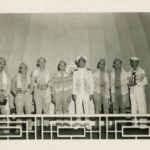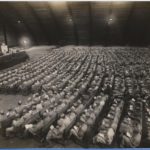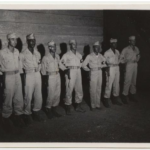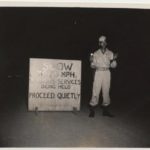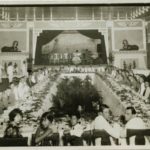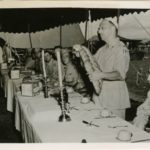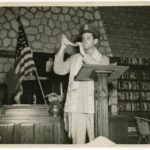Rosh Hashanah Resources
by David P. Rosenberg, M.P.A., Senior Reference Librarian – Collections, Center for Jewish History
In honor of the New Year I examined ten resources available at the Center (for the ten days of repentance) that reflect on the experience of the High Holidays in the military.
Memoirs
1) Reflections on World War II: Chaplain Jacob Kraft’s Letters to Leah reprints Kraft’s letters to his congregants (in Congregation Beth Shalom in Wilmington Delaware) who he left, with their full support, for the military chaplaincy. The change between letters from during the war and those from after victory is dramatic and touching; they give a real taste of Rabbi Kraft’s sentiments at the time.
The 1944 letter speaks about military cooperation for the holiday, and the help of the Jewish Welfare Board. It quotes a statement from a GI who recently returned from overseas: “I never knew that there could be so much joy in walking along the street with my wife or playing with my boy. They mean far more to me now than when I was in the States.”
Rabbi Kraft concludes the touching but restrained letter with a poignant prayer: “There is good reason to believe that the year 5705 will usher in the year of Victory. May God grant that it be the victory of the unshackled human spirit over brute strength and brute evil. God bless you and all your dear ones with health and happiness. May the New Year bring freedom to all mankind and abiding peace on earth.”
His letter of Rosh Hashanah 5706 starts with the following: “These Rosh Hashanah greetings are being written immediately following V[ictory over]J[apan] day, and the traditional prayer is on all lips “Shehechiyanu, V’keemanu” (We thank Thee, O Lord, that we have lived to witness this day). We rejoice not only because of victory over a treacherous and unscrupulous foe, but also because this victory has saved countless human lives and put an end to the wasteful expenditure of natural and human resources.”
The concluding paragraph has marked differences from the year before: “May I extend to you the blessings of this Rosh Hashanah which is filled with such hopeful promise. May this promise be fulfilled. May God grant you and your dear loved ones strength, peace and abiding happiness.”
2) The wartime memoirs of Rabbi Harold H. Gordon, Chaplain on Wings recounts a “serious altercation” he had with a commanding officer regarding getting soldiers leave for holiday services. It resulted in a “special investigating team” addressing the matter. He recounts that “Fortunately, we knew that there was more than one way of skinning a cat. We Jewish chaplains learned very early in our chaplaincy service that it was often more important to cultivate the friendship of a first sergeant or even a ‘buck’ sergeant than that of the C.O., because it was the sergeant who was responsible for carrying out the C.O.’s directives…”
3) An American Rabbi in Korea, A Chaplain’s Journey in the Forgotten War recounts how Rabbi Rosen was transferred to Japan for surgery and was released in time for the holidays. “He conducted services in Kobe at the Jewish synagogue built by the Sassoon Family before World War II.” (see The Sassoon dynasty and The Sassoons, two books held by the American Sephardi Federation, for more information on the family of “merchants, philanthropists, and men of letters, originally from Baghdad” [Encyclopaedia Judaica 2nd Ed.])
Resources
4) A Chapel Songbook, Sing and be Joyful from the Chaplain, U.S. Marine Corps, compiled by Captain Samuel Sobel, CHN, USN has music and words for “Ere space exists” and “Into the tomb of ages past”–two songs indicated in the table of contents as specific to the New Year.
5) A Program and Resource Guide for Jewish lay leaders ministering to Jewish personnel in the Armed forces in the absence of a Jewish chaplain, outlines the holiday succinctly in one page. One section struck me: “If extreme necessity precludes the holding of full services, cut the services short, but on no account may you postpone the observance. Try to arrange for at least one festive meal, with candles and Kiddush to celebrate the day.” This work was printed by Armed Forces Chaplains Board with cooperation of the Commission on Jewish chaplaincy, National Jewish Welfare Board.
Archival collections
6) The National Jewish Welfare Board was founded in “1917 to provide support for soldiers in times of war” (catalog entry). The collection, I-337, spans more than 1500 linear feet and has information on the holiday in various locations, including a subseries dedicated to holiday files. (Subgroup I: Governance, Series C: Central Records Center, Subseries 4: Holiday Files, 1905-1972 (bulk 1935-1960)) Finding aid here.
7) There is also a collection of chaplaincy records: National Jewish Welfare Board military chaplaincy records, I-249. Finding aid here.
Reflections of the National Jewish Welfare Board efforts
8) Despite the great work done by the National Jewish Welfare Board, supporting thousands of soldiers, some of their work was also ridiculed. Chaplain Livazer reflects on acquiring prayer books for the High Holidays in The Rabbi’s Blessing: “…and within a few days received a package of fifty Adler prayerbooks with English translation and two thousand machzorim from the Jewish Welfare Board, which were considered a joke even by the rabbis who had compiled them, so devoid were they of all content…” (over twenty Machzorim from the partner collections have digitized and are available online)
9) Rabbis in uniform has twenty pages dedicated to the high holiday services. In one section, Supply Chaplain Maurice Kleinberg recalls how he arranged for transport of Kosher food from the National Jewish Welfare Board. “I could see no reason why we could not have such delicacies as lox and cream cheese or salami. First, however, we had to get a special permit that would have the shipments of the Jewish Welfare Board a higher priority…Quartermaster notified us that we would have to be on hand for the unloading of our boxes; to prevent pilferage…we had to organize a 24-hour guard duty roster…men were happy to serve when they found out what the precious cargo contained…”
Nisson E. Shulman remembers how they had a shofar that would not blow; they received the shofar from the National Jewish Welfare Board. First “Sam, the tailor” suggested they pickle it in vinegar as he claimed they did in Europe when a shofar would not blow. This remedy did not work. Next he took the Shofar to the Naval Exchange garage:
“What’s your problem, Chaplain?”
“Well I’ll tell you. I have a stubborn Shofar and I would appreciate your blowing it out with your air pump.”
The Navy rises to any reasonable emergency. But this Shofar was unreasonable. Even after the air pump treatment, it would not blow. But the garage attendant recommended that I try the fire station since they had a much more powerful air compressor. Service time was nearing and I was open to all suggestions.
The first attempt with the fire station’s air gun blew the Shofar across the room. We picked it up tenderly and saw that, thank God, it was not damaged.
“Give me that Scotch Horn again, Rabbi,” urged the Fire Chief. We held it down together. We forced the air through. We shot a sweetening agent into it; we gave it a dose of perfume. I lifted it to my lips and, lo and behold, there came forth the blast of the Shofar. But the overpowering vinegar aroma was still very much there…
More current reflections on holiday observance
Just as Rabbis petitioned and became Chaplains in the Civil war (see this blog entry) and the Jewish Welfare Board helped support Jewish soldiers during the Great War, Rabbi Kraft enlisted to help support Jewish soldiers during WWII, and Rabbi Rosen served in Korea, there continue to be Jews in the military and clergy to serve them. People doing historical research frequently reference The Forward on microfilm, the YIVO archives also has Forward Association records, RG 685 as well as related collections such as Abraham Cahan’s collection RG 1139. Cahan was the Founder of the Jewish Daily Forward and its editor-in-chief from 1901 until his death in 1951.
10) This article from the Forward (electronically available in the Center’s reading room, as are over 200 electronic resources) from last year preserves the more current holiday celebrations.
We here at the Center wish you a sweet new year and all the best in 5773. To conduct your own holiday-inspired search of the collections, click here.

